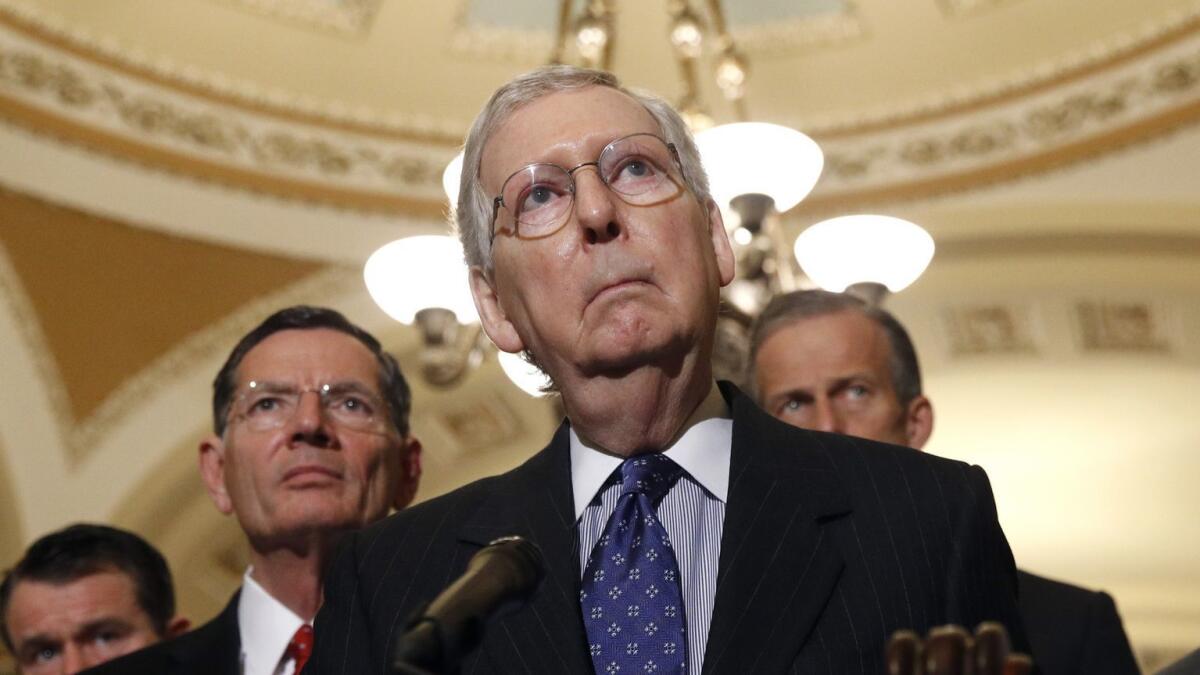GOP leader Sen. Mitch McConnell declares ‘case closed’ on Mueller probe

- Share via
Reporting from Washington — Senate Majority Leader Mitch McConnell is declaring “case closed” on the Russia probe and potential obstruction of justice by President Trump, deriding Democrats who he says are “grieving” the result.
The Republican leader, in his most significant public comments yet on the investigation, opened the Senate on Tuesday with a speech discussing how special counsel Robert S. Mueller III’s “exhaustive” probe went on for two years and is now complete. The remarks, which are certain to please the president, were being billed as his final thoughts on the topic.
“It’s finally over,” McConnell said.
Republicans, taking their cues from Trump, are eager to push past the investigation. But the case is anything but closed for Democrats, who are pressing for further oversight of the White House and the president’s handling of the Mueller probe.
McConnell questioned if others are ready to move on from the “breathless conspiracy theorizing.”
Mueller’s results are “bad news for the outrage industrial complex but good news for the rest of the country,” the Kentucky senator said.
FULL COVERAGE: Robert Mueller finishes his investigation into President Trump’s 2016 campaign »
Senate Democratic Leader Charles E. Schumer of New York shot back in his own speech immediately afterward, calling McConnell’s words an “astounding bit of whitewashing.” He challenged McConnell to move legislation that would improve election security and be tougher on Russian sanctions.
“What we have here is a concerted effort to circle the wagons, to protect the president from accountability,” Schumer said.
While McConnell is determined for the Senate to move on, the Democratic-led House is aggressively pursuing a copy of the full, unredacted Mueller report. Atty. Gen. Robert Barr released a redacted version to the public last month, but Democrats want to see the full document, plus underlying documents, and have scheduled a committee vote for Wednesday to hold Barr in contempt for not providing it.
On Tuesday, House Judiciary Committee staff are set to meet with Justice Department officials for final negotiations before the contempt vote. Judiciary Committee Chairman Jerrold Nadler (D-N.Y.) said late Monday that he hopes to make “concrete progress” toward resolving the dispute over gaining access to the report.
The contempt vote would be the opening salvo in what could be a lengthy, acrimonious court battle between House Democrats and the Trump administration over Mueller’s findings.
The movement to hold Barr in contempt reflects the deepening rift between Democrats and Barr, whom they accuse of spinning the results of Mueller’s investigation to Trump’s benefit. Barr, in a memo summarizing Mueller’s investigation, said there was insufficient evidence that Trump obstructed justice, a conclusion Democrats fiercely dispute.
Nadler said the version of Mueller’s report that has already been released to the public offered “disturbing evidence and analysis that President Trump engaged in obstruction of justice at the highest levels.” Now, he said, lawmakers need the full version and the underlying evidence “to determine how to best move forward with oversight, legislation and other constitutional responsibilities.”
Justice Department spokeswoman Kerri Kupec said that the department has “taken extraordinary steps to accommodate the House Judiciary Committee’s requests for information” regarding Mueller’s report but that Nadler had not reciprocated. She noted that Democrats have refused to read a version of Mueller’s report with fewer redactions that has already been provided to Congress.
If the committee approves the contempt resolution against Barr, it would head to the full House for final approval. But that step is unlikely to lead to criminal charges. A House vote would send a criminal referral to the U.S. attorney for the District of Columbia, a member of the Justice Department, who would be more likely to defend the attorney general.
Yet by pursuing a contempt resolution, Democrats hope to send a message to the Trump administration about their willingness to invoke congressional powers in the majority. Beyond Mueller’s report, House Democrats have, so far mostly unsuccessfully, subpoenaed administration witnesses and made efforts to gain access to Trump’s personal and business financial records. Trump has said he will block those efforts, declaring he will “fight all the subpoenas.”
Democratic House leaders could file a civil lawsuit against the Justice Department to obtain the Mueller report, an option that could take months or even years to resolve. Some committee members have suggested they also could fine Barr as long as he withholds the information. They could also open impeachment proceedings against Trump, though House Speaker Nancy Pelosi (D-San Francisco) has said she’s not interested in doing that, for now.
Republicans have lambasted the Democratic tactics as overreach and defended Barr. The top Republican on the Judiciary Committee, Rep. Doug Collins of Georgia, said “Democrats have launched a proxy war smearing the attorney general” when their anger actually lies with the president.
There is precedent for sitting attorneys general to be held in contempt of Congress. In 2012, the House held then-Atty. Gen. Eric H. Holder Jr. in contempt over the botched Fast and Furious gun-tracking operation. Republicans cited the Justice Department’s failure to turn over, without any preconditions, documents related to the risky operation. The Justice Department took no action to prosecute the attorney general.
Mueller’s report — now a bestseller even in redacted form — states that his investigation could not establish a criminal conspiracy between the Trump team and Russia. However, it did not reach a conclusion on whether Trump obstructed justice. Mueller didn’t charge Trump but wrote that he couldn’t exonerate him, either.
Democrats on the House Judiciary Committee say Congress is “the only body able to hold the president to account” since the Justice Department has a policy against indicting a sitting president.
More to Read
Get the L.A. Times Politics newsletter
Deeply reported insights into legislation, politics and policy from Sacramento, Washington and beyond. In your inbox three times per week.
You may occasionally receive promotional content from the Los Angeles Times.










